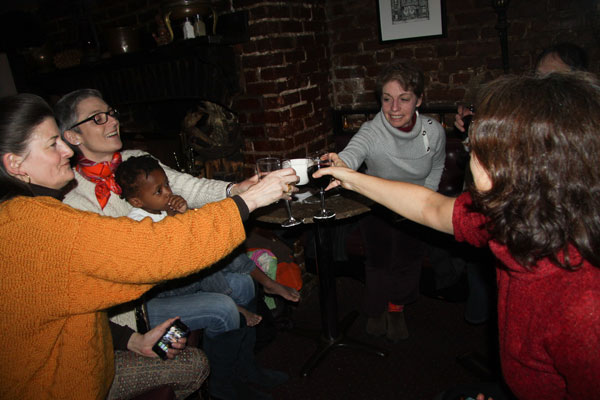
Members of N.Y.U. Faculty Against the Sexton Plan celebrated at La Lanterna di Vittorio on MacDougal St. Friday evening after the no-confidence vote results were announced. Photo by Tequila Minsky
BY LINCOLN ANDERSON |Concluding a highly anticipated five-day electronic vote, faculty at New York University’s largest school voted no confidence in President John Sexton last week — and summarily urged him to resign.
The final tally was revealed early Friday evening, with the results that the faculty of Arts and Science voted 52 percent for and 39 percent against a verdict of no confidence. Of 682 eligible faculty, 83 percent weighed in on the question, which was mainly spurred by N.Y.U.’s 2031 development plan on its two South Village superblocks, where about 40 percent’s of the school’s faculty live.
N.Y.U. Faculty Against the Sexton Plan — which is a plaintiff in what’s called an Article 78 lawsuit against the city’s approval of the university’s “N.Y.U. 2031” scheme — issued the following statement:
“N.Y.U.’s faculty of Arts and Science has now voted, by 298 to 224 with 47 abstentions, for a motion of no confidence in the leadership of President John Sexton. We call on him to honor that consensus by resigning, and ask that the trustees accept his resignation.
“As the trustees comprise the third tier of shared governance, we hope they will act quickly to restore faculty morale, by working with us to turn N.Y.U. into a more open university,” FASP members said, “one that is transparent in its financial dealings, and more democratic in its management of academic affairs.”
Sexton, giving no sign he would step down, released a statement of his own, praising the university’s ongoing “academic trajectory”
“I have spent the majority of my professional life at N.Y.U.,” he said. “In those three decades, I have been animated by a single purpose — to serve my institution well, and to try to improve it. Through a collective effort involving trustees, alumni, university leadership and faculty, we have during the past 30 years transformed N.Y.U. from a decent regional university into an international research university that stands among the top institutions in the world.
“Now we are in a time of tremendous pressure on higher education,” Sexton continued, “and my goal is to sustain that academic momentum while adapting N.Y.U. to a dramatically changing environment. Over the past several months, there has been vigorous debate about N.Y.U.’s direction, resulting in both expressions of support — from the Medical School, from the Nursing School, from the Dental School, from the deans of all the schools, as well today’s e-mail to the N.Y.U. community from the trustees — and now this expression of dissatisfaction from FAS [faculty of Arts and Science].
“In the university setting, we believe in debate and criticism; it helps us improve,” Sexton said. “That will be particularly important in the months and years ahead, because we are at a moment that compels meaningful change in higher education.
“It is also the case that faculty must be at the center of the academic endeavor and involved in the decision-making,” he added. “We have taken some important steps in that direction and, particularly with this vote in mind, that effort will continue. I look forward to working with the faculty to maintain N.Y.U.’s academic trajectory and prepare for the challenges ahead.”
In a statement, Martin Lipton, chairperson of the university’s board of trustees, said they stand firmly behind Sexton:
“The board of trustees unanimously and strongly supports President John Sexton, and believes in his strategic direction for the university,” Lipton said.
“We have seen a strong, thriving, advancing university during his tenure as president,” Lipton said. “We note a 12 percent increase in applications for freshman admission in this year, the sixth straight year of record applications. We see the improvement in the academic qualifications of entering freshmen during John’s presidency, the increase in retention and graduation rates, and the expansion of financial aid. … We see a very successful record of fundraising — essentially $1 million per day, day in and day out since John Sexton became president. We note improvements in the finances, in the budgeting, and in the physical facilities of the University over the last 10 years, as well as the successful handling of the de-merging of Mt. Sinai’s and N.Y.U.’s medical centers, and the dramatic turnaround at the N.Y.U. Langone Medical Center. We see the increase in tenured and tenure-track faculty, particularly in the arts and sciences, and a marked improvement of our ability to attract top scholars.
“We believe that the global network created during his presidency has offered new academic opportunities to faculty and students (twice as many of whom study abroad as did 10 years ago), distinguished N.Y.U. among U.S. universities, and attracted the commitment and support of sophisticated partners.”
In related news, a community lawsuit filed by longtime Washington Square Village non-N.Y.U. tenants and others against the university’s development plans was dismissed this week by Supreme Court Justice Elizabeth Coin. Coin ruled that the suit’s contention that the residents were being “deprived of essential services” should go before the state’s Division of Housing and Community Renewal, rather than be heard in court.
The suit argued that N.Y.U.’s plan to add two large new infill buildings in the complex’s courtyard would deprive the residents of use of the backyard Sasaki Garden, which they have had consistent use of ever since moving in decades ago.
The plaintiffs’ attorney, Lawrence B. Goldberg, a resident of the complex, said he was “extremely disappointed” at Coin’s ruling, charging that she “took five months to do nothing.” He told The Villager he filed the necessary papers to appeal the ruling and that the decision to appeal must be made within several months, but that the plaintiffs will know well before then how they’ll proceed.
Lynne Brown, N.Y.U. senior vice president for university relations and public affairs, said of Coin’s verdict, “We are very pleased with today’s ruling and also look forward to prevailing in the Article 78 case that has been filed with regards to N.Y.U.’s expansion plans.”



























